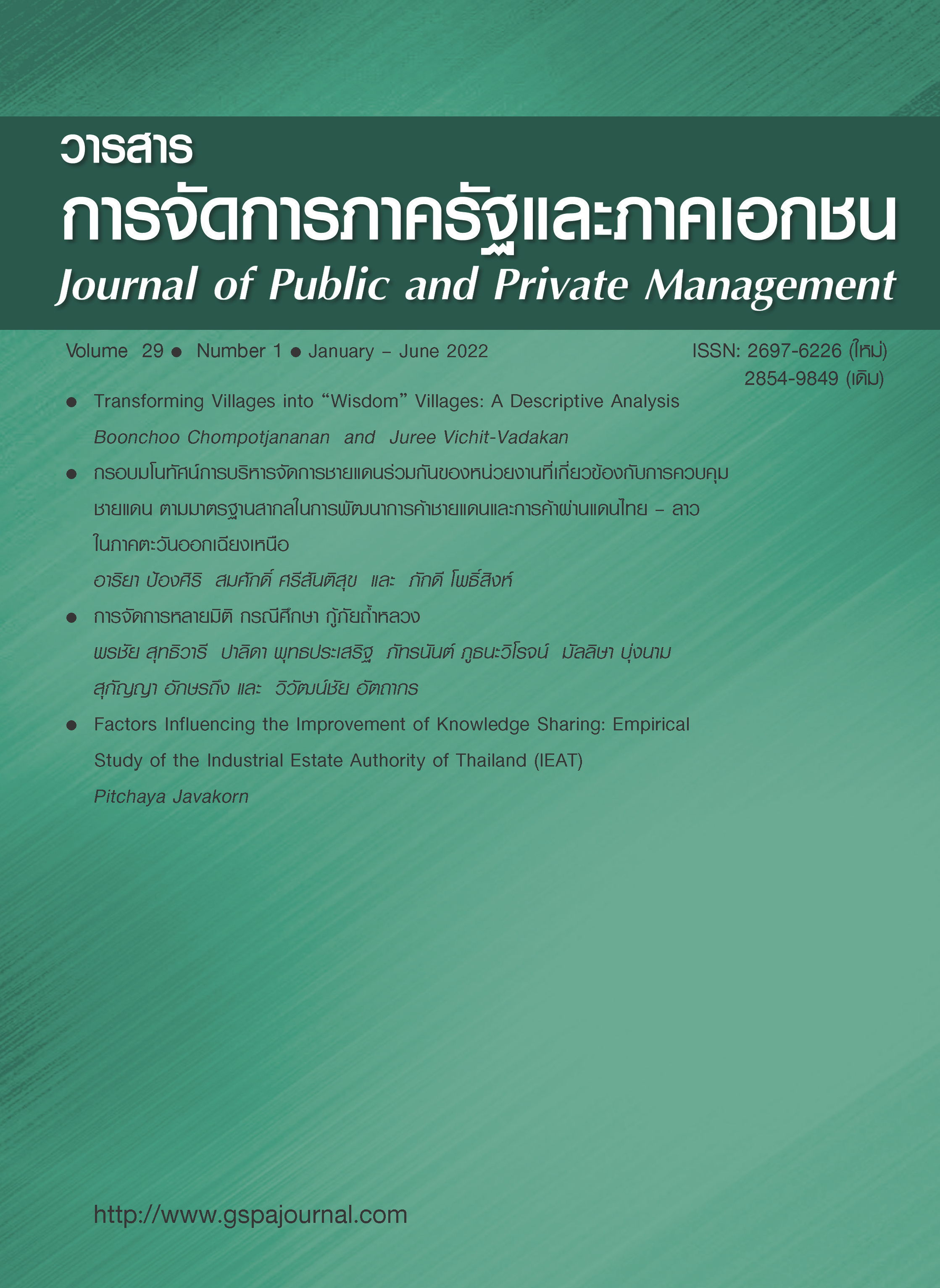Transforming Villages into “Wisdom” Villages : A Descriptive Analysis
Keywords:
Leader, virtue, knowledge, wisdomAbstract
The study investigated the real pictures of rural communities in Thailand and identified the factors that transform common villages into wisdom villages. The study applied the qualitative method through three main research methods comprised of document analysis, semi-structured interviews, and participant observation. The semi-structured interviews were conducted from three settings comprised of Baan Pa-ngun (Chumporn Province), Baan Fang-klong (Nakonpathom Province) and Baan Khao-din Baan(Sakaeo Province), communities from Southern, Central and Eastern of Thailand respectively. The researcher has been through rural villages in Thailand, which has helped to dispel some myths about rural society and rural development concepts which listed as self-reliance and fallacies of the idealized rural Thai society. The researcher found that the most important factors to transform common villages into wisdom villages was not the soil, water, money, nor resources but it was virtue, knowledge and wisdom, coupled with the courage that the leader in communities had, greater than other people. Finally, it is recommended that there already were wise men in the area who were turning inspiration into reality. Rural development plan should be the knowledge that will help to build up the leaders who work hard, who never give up in order to have a better life.
References
Achenbaum, W. A., & Orwoll, L. (1991). Becoming wise: A Psychogerontological interpretation of the book of job. International Journal of Aging and Human Development, 32(1), 21-39.
Angell, R. C. (1951). Community leadership. The American Journal of Sociology, 57(1), 101-109.
Kerdsri, B. (2010). Factors Affecting the Success in Application of Sufficiency Economy Philosophy in the Agricultural Reformed Area: A Case Study of Tambon Nikom Krasiew, Danchang District. NIDA.
Birren, J. E., & Fisher, L. M. (1985). Aging and speed of behavior: Possible consequences for psychological functioning. Annual Review of Psychology, 46(1), 329-353.
Bonjean, C. M. (1963). Community leadership: A case study and conceptual refinement. The American Journal of Sociology, 68(6), 672-681.
Burns, J. M. (2003). Transforming Leadership: A New Pursuit of Happiness (Vol. 213). Grove Press.
Costantino, T. E., & Greene, J. C. (2003). Reflections on the use of narrative in evaluation. The American Journal of Evaluation, 24(1), 35-49.
Gibb, C. A. (1948). The principles and traits of leadership. Journal of Abnormal Psychology, 42.
Goeppinger, A. (2002). The fallacies of our reality: A deconstructive look at community and leadership. International Journal of Leadership in Education, 5(1), 77-83.
Hirsch. (1993). The Village in Perspective: Community and Locality in Rural Thailand.
Holliday, S. G., & Chandler, M. J. (1986). Wisdom: Explorations in Adult Competence. New York: Karger.
Khotayun, J., & Somsopon, W. (2011). Success on development of sufficiency economy village. Local Administration Journal, 4(3).
Kanjanapan, A. (2010). Linking Thai anthropology in globalizing Asia: A view from rural Southeast Asia. Journal of China Agricultural University (Social Sciences Edition).
Kramer, D. A. (1990). Conceptualizing wisdom: The primacy of affect-cognition relations. In Sternberg, R. J. (ed.). Wisdom: Its Nature, Origins and Development. Cambridge: Cambridge University Press.
Kyung, S. A. (2000). Wisdom and the Art of Leadership: A Practical Theology of Leadership Development through Nurturing Wisdom. the Faculty of School of Theology, Norwalk.
Laungaramsri, P. (2015). Commodifying sovereignty: Special economic zones and the neoliberalization of the Lao frontier. In Impact of China’s Rise on the Mekong Region. New York: Palgrave Macmillan.
Leeuw, F. L. (2003). Reconstructing program theories: Methods available and problems to be solved. The American Journal of Evaluation, 24(1), 5-20.
Mathison, S. (2005). Why triangulate? Educational Researcher, 17(2), 13-17.
Jaisue, N. (2014). Factors Related to the Successful of Sufficiency Economy Village. Dhurakijpundit University Research Center, Dhurakijpundit University.
Orwoll, L., & Perlmutter, M. (1991). The study of wise persons: Integrating a personality perspective. Wisdom: Its Nature, Origins, and Development, 160-177.
Pascual-Leone, Juan. (1990). An essay on wisdom: Toward organismic processes that make it possible.
Treechai, P. (2009). The revitalization of community strength at Nongklangdong community, Silaloi sub district, Samroiyod district, Prachuap Khiri Khan province. Rom Phruek Journal, 27, 125-159.
Pimainok, A., & Lunsomrong, P. (2015). Enable Factors in Community Development Achievement Based on the Sufficiency economy Philosophy of Ban Namsab Community,Wangnamkheo Sub-district, Wangnamkheo District, Nakhonratchasima Province. The 2nd National Conference 2015 “Innovation and Development for ASEAN”. Nakhonratchasima College.
Sopana, P., Siriswat, C., Khampa, S., & Sripathar, S. (2010). Causal factors affecting the strength of rural communities in the lower part of Northeastern Thailand. Rajabhat Maha Sarakham University Journal, 4(2).
Rosenbach, W. E., Taylor, R. L., & Youndt, M. A. (2012). Contemporary Issues in Leadership. Hachette UK.
Rothbauer, P. (2008). Triangulation. The SAGE Encyclopedia of Qualitative Research Methods, 1, 892-894.
Rodsin, S. (2011). Community Strength: A Case of Pangjampee Village, Huay-Kaew District, Mae-on, Chiangmai. Public Administration Graduate School, Slipakorn University.
Choosawat, S. (2012). The Application of Populay Wisdom for Community Empowerment’s Ban Lohhan Amphur Pabon Phattalung Province. Thesis, Department of Province, Politics and Government. Faculty of Political Science, Hatyai University.
Wilkinson, K. P. (1986). In search of the community in the changing countryside. Rural Sociology, 51(1), 1-17.
Williams, R. (1970). Radical and/or Respectable. The Press We Deserve, 14-26.
Downloads
Published
How to Cite
Issue
Section
License

This work is licensed under a Creative Commons Attribution-NonCommercial-NoDerivatives 4.0 International License.



